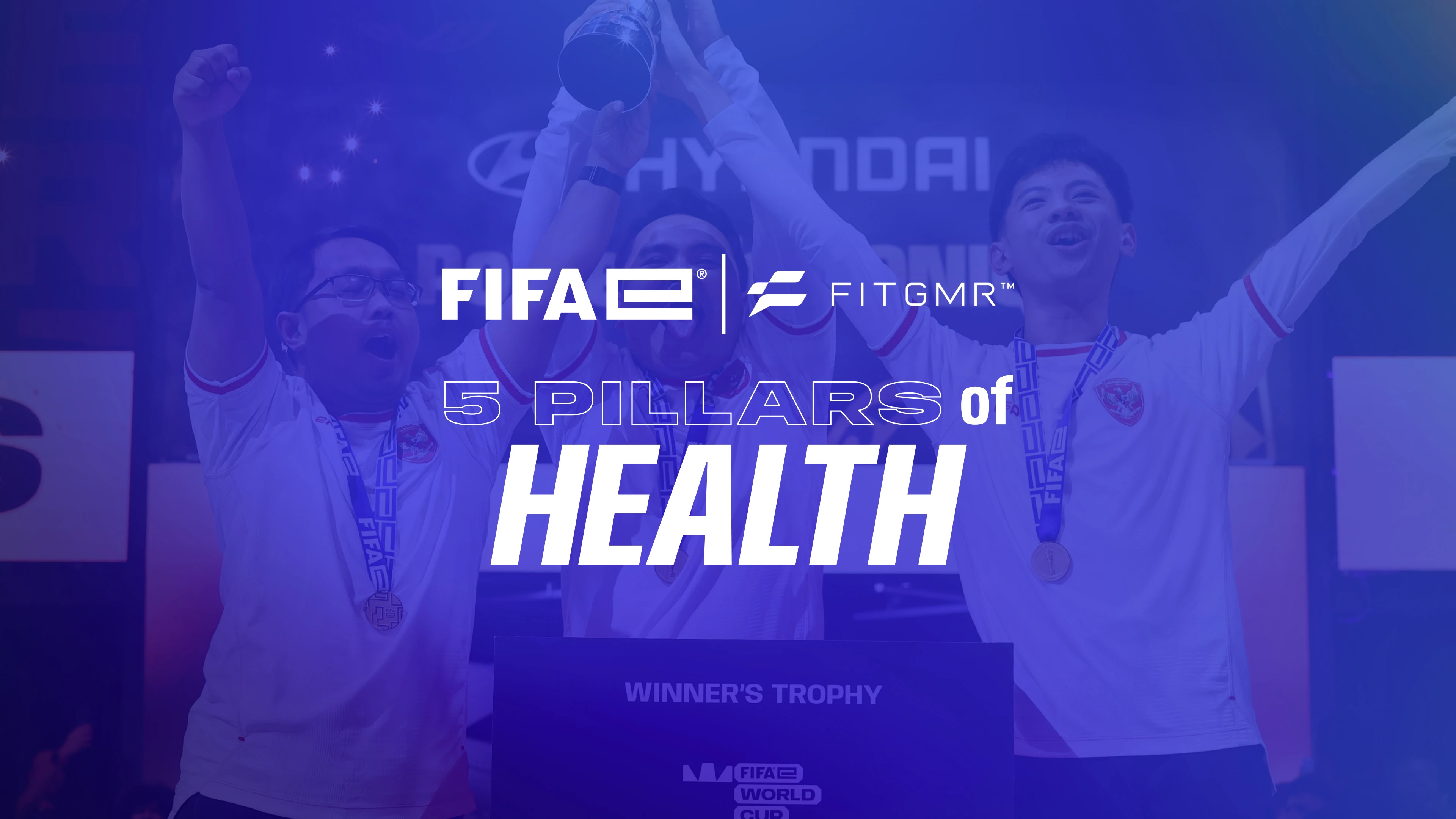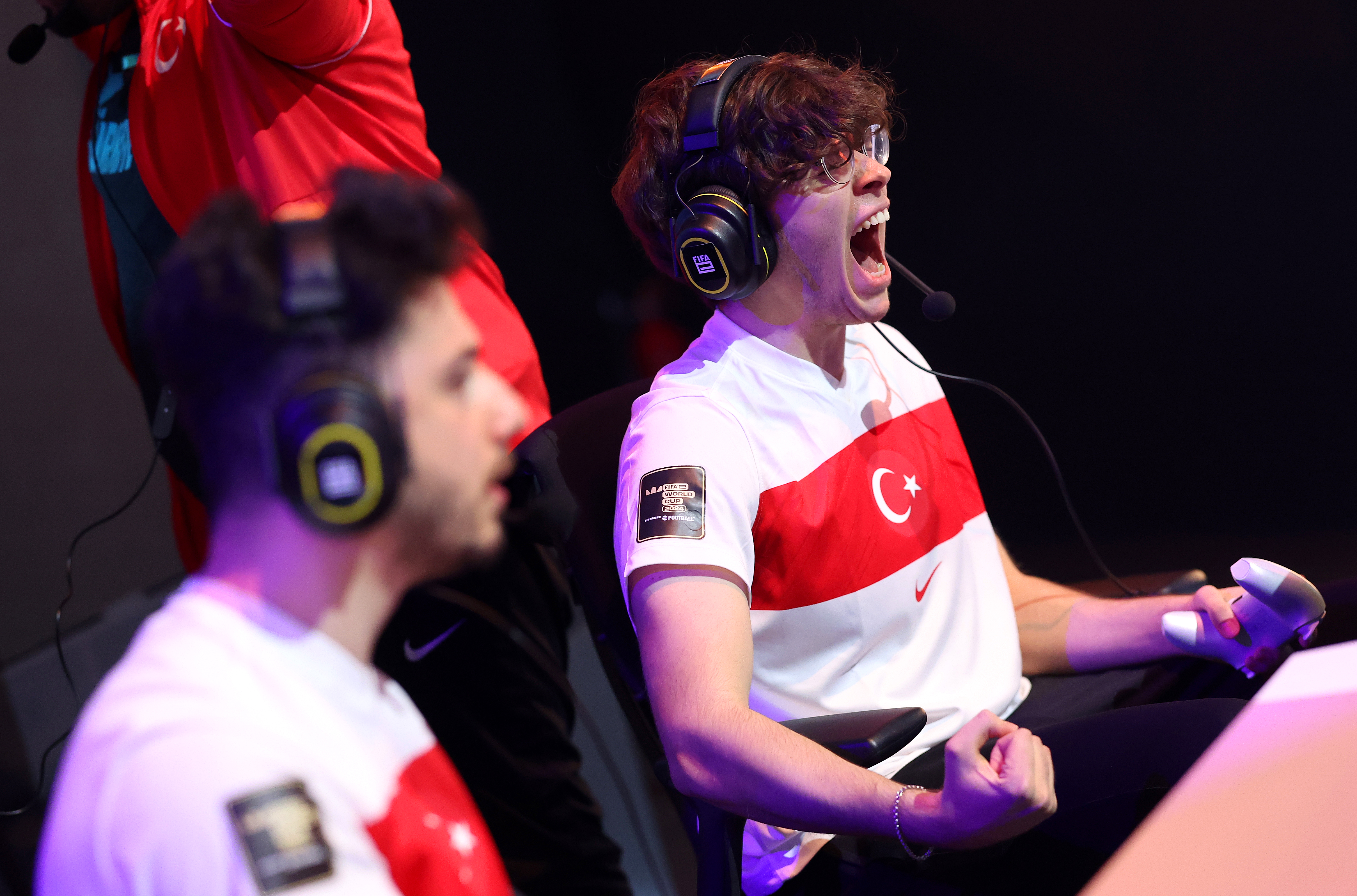
Your browser is not supported.
We are sorry, but the version of your browser is not able to display the content of fifa.gg. Please download the latest version or visit fifa.com.
Visit fifa.com01.09.2025
For many years, digital football was viewed as the opposite of traditional football, or at best, unrelated. But as the industry continues to grow, reality has emerged: esports are not only becoming an integral extension of the football ecosystem, but they are also a distinct and respected discipline in its own right.
And as both a part of traditional football and as a discipline on its own, football esports have redefined traditional notions of health and performance, challenging the stereotype of gamers leading unhealthy and sedentary lives.
In reality, excelling at digital sports demands more than just skill. Being an esports player or a top performer requires strong physical and mental wellbeing.
FIFAe, in collaboration with FITGMR, reinforces its dedication to players’ wellbeing and community health through the Good Game Promise by promoting the 5 Pillars of Health: physical maintenance, mental conditioning, sleep, nutrition, and lifestyle.
Said pillars are vital for gaming enthusiasts and anyone involved in the esports scene: players, coaches, or federations. Because wellbeing remains at the core of sustainable success. It’s not just about building better competitors, but also about nurturing healthier, more balanced individuals that will display their optimum performance on the stage.
To become a well-rounded professional or just better at gaming, FITGMR has a primary objective: to help players of all levels improving their overall health, and specifically their performance in the game.
These pillars, based on research and experience with top esports teams, are designed to
support and improve performance,
prevent burnout,
build long-term habits for gaming success and optimal health.
Better health = better performance
Any high-pressure activity – like gaming or esports – places intense demands on focus, reaction speed, and emotional control. Without sufficient rest, balanced nutrition, mental wellbeing, physical care, and a healthy lifestyle, recovery becomes deficient. Over time, this can lead to fatigue, frustration, illness, and even injury.
That’s why developing skills to manage stress, optimize sleep, and sustaining daily physical activity aren’t optional. They are part of the foundation needed to grow as a gamer—and as a person.
Staying in tune with the five pillars of health requires an active effort and understanding of how the lack of a well-rounded lifestyle can affect your hobby, professional career and many other aspects of our day-to-day life.
Up next, a quick guide on what it means to follow the 5 pillars of health by FITGMR and the resources to improve all these life aspects.
Gaming may not involve sprinting on a field or taking hikes, but our bodies face significant stress from high-pressure moments that spike heart rates to long hours of sitting that hip and low back muscles, affect neck and shoulder posture, and cause repetitive elbow, wrist and finger strain. Physical maintenance isn’t optional; it’s essential for sustaining energy, focus, and consistency during competitive play.
You don’t need a gym membership or go through an intense workout routine to stay game-ready. Even with 15–20 minutes of daily movement, whether that’s walking, stretching, yoga or other activities that involve moving, can improve circulation, reduce tightness, and sharpen your mind.
Quick drills between matches or light walks after gaming sessions can help maintain performance without draining your energy.
Do not avoid any discomfort you may have, as fatigue and even injuries can creep in. Pro players and traditional athletes must listen to their bodies, stay active, and recover in smart ways.
Stretching prompts that remind you when to move, yoga routines, and movement tracking will improve your health. And physical care becomes a core part of the grind. If your body breaks down, your game levels down.
A common and easy way to start practicing physical care is getting nice economic gear – a good chair and comfortable setup can keep you in shape and free from injuries and strains.
For more details on how to maintain a good physical health, go here.
In esports, mechanical skill and experience are not enough. And as a good gamer or esports players, you’ll know that! The best players in the industry are able to master the pressure, know how to bounce back from losses, and are able to stay focused under stress. Just like elite athletes in traditional sports, the best professional gamers now rely on mental conditioning to unlock consistent, high-level performance.
Mental resilience is built through regular practice, best known as habits. Breathing exercises, quick check-ins between games, and meditation can very much boost focus, reduce tilt, and improve decision-making processes.
Mental training works best when it’s part of your daily routine. Track your mindset and mentality, try resetting after hard matches, and just check in with your emotions and stress levels regularly.
For more details on how to maintain a good mental conditioning, go here.
A little-known fact is that food choices directly impacts your gameplay. While it’s tempting to rely on energy drinks or sugary snacks for quick boosts, these often lead to crashes, brain fog, poor focus and let’s face it: an overall decline in physical and congitive health. If you desire a high-level performance, you need to achieve stable energy, mental clarity, and fast recovery — and that starts with a balanced nutrition.
Packing your meals with vegetables, protein and healthy fats gives your brain and body the fuel it needs. Natural foods support cognitive function and keep energy steady, without crashing your physical and cognitive performance. Meanwhile, excessive consumption of added sugars and processed foods are metabolically unhealthy and can ultimately slow you down. Smart snacking, consistent hydration, and moderate caffeine consumption will be game changers, phase-shifting you to being sharp and away from feeling sluggish.
Top players and top traditional sports athletes treat nutrition like a training tool and a key part of their performance potential. That involves planning meals, avoiding sugar crashes, and listening to the body’s cues. Food is not just fuel – it is actually part of your competitive advantages.
For more details on how to maintain a good nutrition, go here.
Sleep is probably the most underestimated tool in a gamer’s performance routine. Whether you’re playing casually or training competitively, quality rest directly affects reaction speed, focus, memory, and mood. Late nights and long screen sessions can silently drain your energy and make burnout and trouble focusing more likely.
Just like training your skills in a game or mastering the mechanics of it, sleep requires consistency and intention. Keeping a regular sleep schedule, creating a calming bedtime routine, and optimizing your room for rest can significantly improve how you feel and perform. Even small changes like dimming lights, avoiding screens before bed, or taking a warm shower can help your body wind down easier.
Besides being a break from training, sleep also must be a key part of your training. While you sleep, your brain processes learning, the body recovers, and mental stamina is rebuilt: it basically recharges you.
Whether you’re trying to rank up, support your team better or even leading your team members, investing in better sleep habits will turn to be your secret weapon. Your gameplay tomorrow starts with how well you rest tonight.
For more details on how to maintain a good sleep routine, go here.
Your performance as a casual gamer or as an esports player is about reflexes, strategy and mastering mechanics. But said potential unlocks when you improve your daily habits. A healthy lifestyle that includes outdoor time, hobbies, and social connections can prevent burnout, improve mood, sharpen your focus and shape your overall wellbeing for the better.
Simple steps like morning walks, joining a new hobby, or spending time with friends or loved ones can recharge your energy and keep motivation high. Outdoor activities of any kind reset your mind, while hobbies strengthen creativity and focus. Social connection, meanwhile, builds emotional resilience, which is key for bouncing back from tough matches or losing streaks.
Pushing your limits like trying something new or taking on a new personal challenge, helps you develop a confidence boost and a mindset that thrives under pressure. A general healthy living fuels both personal and competitive success.
For more details on how to maintain a well-rounded lifestyle, go here.
FITGMR joins forces with FIFAe to support the current and next generations of competitive gamers by prioritizing health, balance, and sustainable performance. Through science-backed tools, the promotion of healthy routines, and education across five essential elements of well-being (physical maintenance, mental conditioning, sleep, nutrition, and lifestyle) the goal is to help gamers, amateur players, and top professionals in the industry become happier, healthier, and better. This focus becomes even more essential ahead of the FIFAe Finals 25, where peak performance and mental resilience is key to withstanding the pressure of the tournament.

